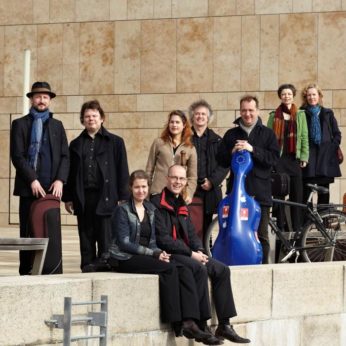Composer: Georg Frideric Handel (b. 1685 - d. 1759)
Performance date: 09/07/2016
Venue: St. Brendan’s Church
Composition Year: 1708
Duration: 00:25:57
Recording Engineer: Richard McCullough, RTÉ lyric fm
Instrumentation Category:Baroque Ensemble
Instrumentation Other: S-solo, 3vn, va, vc, ob, db, thb, hpd
Artists:
Concerto Copenhagen (Antoine Toruncyzk [oboe], Fredrik From, Peter Spissky, Antina Hugosson [violins], Torbjörn Köhl [viola], Judith-Maria Blomsterberg [cello], Kate Hearne [cello, recorder], Marrias Frostenson [bass], Fredrik Bock [theorbo], Marcus Mohlin [harpsichord]) -
[baroque ensemble]
Maria Keohane -
[soprano]

Cantatas have become something of a specialty in Bantry, primarily because they
are both glorious music, are comparatively unknown and, as with Vivaldi’s
violin concertos, there are a lot of them. They were composed for private
performance in the palaces of cardinals and other wealthy nobility. These
chamber cantatas were mostly composed for solo voice and a one-to-a-part
ensemble with a small continuo group in order to fit onto a small stage.
Handel was just 22
when he traveled to Rome, a trip which lasted three years and saw the
composer’s style develop dramatically. This Italian sojourn would turn out to
be one of the most important and fruitful periods in Handel’s life. Shortly
after his arrival in Rome at the end of 1706, Handel found himself at the
centre of the Accademia degli Arcadi, a
group of powerful cardinals, wealthy aristocrats, poets, thinkers and musicians
who gathered in the palaces of various patrons on Sunday evenings. As public
opera was forbidden in Rome by Papal decree, Handel started writing secular
cantatas for these occasions, often collaborating with a patron and poet in the
course of an evening and performing the work before the night was out.
Ah! Crudel consists of three arias separated by two
recitatives and preceded by a glorious instrumental introduction. This is
effectively a two-movement concerto for oboe and strings with the opening
movement repeated. This is Handel in his most cheerful and uplifting mode. The
arias tell a well-worn tale of love scorned and love regained, if the hopeful
final aria is to be believed. With his limited instrumental resources he still
manages to achieve a wide variety of moods in keeping with the scorned lover’s
monologues. The opening aria, where the beloved is reproached for her cruelty
and disdain is in a slow tempo (Adagio).
Its vocal part shows a contrary development with many unusual and dissonant
intervals expressing the lover’s sorrow. The subsequent recitative is with basso continuo alone leading to a more
lyrical and fluent aria expressing the lover’s faithfulness. The stormy
accompanied recitative that follows quickly turns to Arcadian sunshine ahead of
the hopeful Finale that brings back the oboe to add to the mood of rejoicing.
Copyright © 2025 West Cork Music. All rights reserved.
Designed and developed by Matrix Internet